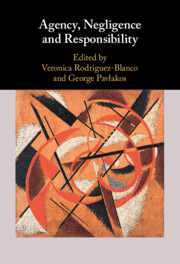Book contents
- Agency, Negligence and Responsibility
- Agency, Negligence and Responsibility
- Copyright page
- Dedication
- Contents
- Figures
- Contributors
- Acknowledgements
- Introduction
- Part I Will and Blameworthiness
- Chapter 1 The Problem of Pure Negligence
- Chapter 2 Unwitting Omissions, Mistakes and Responsibility
- Chapter 3 “How Could You?”
- Chapter 4 Varieties of Negligence and Complications for Moral Blameworthiness
- Part II Agency, Reasons and Inadvertence
- Part III The Significance of Action in Negligence
- Bibliography
- Index
Chapter 4 - Varieties of Negligence and Complications for Moral Blameworthiness
from Part I - Will and Blameworthiness
Published online by Cambridge University Press: 28 October 2021
- Agency, Negligence and Responsibility
- Agency, Negligence and Responsibility
- Copyright page
- Dedication
- Contents
- Figures
- Contributors
- Acknowledgements
- Introduction
- Part I Will and Blameworthiness
- Chapter 1 The Problem of Pure Negligence
- Chapter 2 Unwitting Omissions, Mistakes and Responsibility
- Chapter 3 “How Could You?”
- Chapter 4 Varieties of Negligence and Complications for Moral Blameworthiness
- Part II Agency, Reasons and Inadvertence
- Part III The Significance of Action in Negligence
- Bibliography
- Index
Summary
Harms brought about through negligence are typically morally blameworthy despite being unintended and often unforeseen. How is this best understood? A natural approach parallels a common approach to blameworthiness for unwitting wrongdoing, i.e., acts performed in ignorance of their wrongness: blameworthiness for the act or harm in question is taken to be derivative from more straightforward blameworthiness for relevant earlier failures. I have argued elsewhere for a derivative blameworthiness approach to unwitting wrongdoing that appeals to reasonable expectations about available steps the agent could have taken to avoid or remedy the ignorance in question; and contra Gideon Rosen and Neil Levy, such claims about reasonable expectations do not depend on there being episodes of clear-eyed akrasia in the agent’s past management of her beliefs, so that the account allows for blame in a much wider range of cases. My aim here is to extend this approach to a variety of forms of negligence, defending a similarly broad reasonable expectations version of a derivative blameworthiness view. In particular, I will distinguish and explore cases involving (i) self-conscious negligence, (ii) negligence involving false beliefs about relevant norms of due care, (iii) thoughtless negligence, and (iv) harms due to pure forgetting – though I will argue that the latter often turn out not to be cases of negligence at all, at least for purposes of moral blame.
Keywords
- Type
- Chapter
- Information
- Agency, Negligence and Responsibility , pp. 75 - 96Publisher: Cambridge University PressPrint publication year: 2021
- 1
- Cited by

